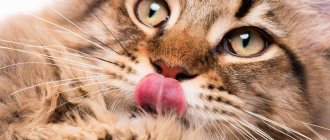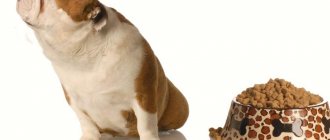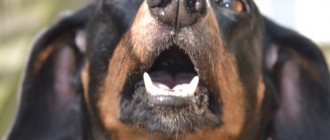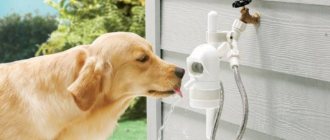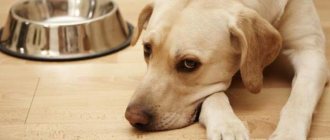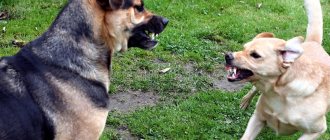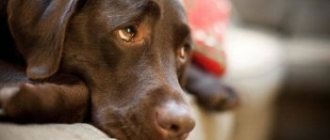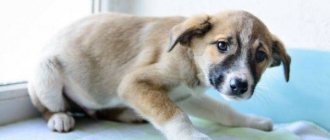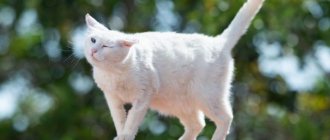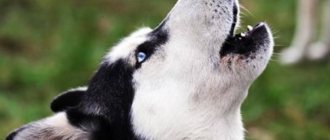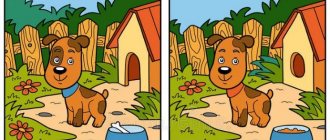Thirst and Hunger
At the sight of food, the dog's salivary glands begin to actively produce a special secretion, which serves to lubricate and facilitate the swallowing of food. The dog begins to actively lick his lips. This is a natural reflex that is normal for the animal. However, a dog may lick its lips due to a constant feeling of hunger. You should carefully monitor the amount of feed consumed by the animal. You shouldn’t indulge your dog and feed it to its fullest, but you shouldn’t limit it too much in food. The portion of food should be appropriate for the age, weight and breed of the dog.
Care should be taken to ensure that the animal has free access to clean drinking water. Let's consider how much water a dog should drink. She should consume about 70-100 ml per 1 kg of weight per day. Naturally, on hot days, water consumption increases significantly. However, constant thirst may also indicate a disease in the animal. You should take water with you during long and active walks. Dehydration can lead to serious pathological changes in the body.
How to fix the problem and how to understand that you need to sound the alarm
A timely visit to a veterinarian can save the dog’s life.
First of all, you need to carry out a diagnosis - according to all the points given above. For example, are there any convulsions or vomiting? Or whether your pet has recently eaten any unusual food. Or maybe he found himself in an unusual situation.
Having gone through all the options, you need to discard the least likely ones in order to determine as accurately as possible what caused the dog to lick.
If the problem has been identified and it does not require medical intervention (for example, the dog is just scared, hungry or thirsty), then there is no need to worry - as soon as the dog calms down or gets what it wants, the problem will solve itself.
But if it was not possible to establish the cause or all additional symptoms indicate possible complications, then it is best not to waste time and immediately contact a veterinarian. It’s better to worry once again and lose several hours, and then several hundred rubles to pay for the services of an expert, than to risk the health and life of your pet. Perhaps every breeder will agree with this statement.
Damage to the mouth and pharynx
If your dog is constantly licking his lips, you should first examine his mouth for injuries and inflammation. Dogs quite often suffer from dental problems: caries, gingivitis, stomatitis. To avoid them, you should carefully watch your pet's mouth. It is necessary to periodically examine the teeth, and when the first symptoms of the disease appear, urgently take the animal to the doctor.
Problems with the oral mucosa can arise due to mechanical injuries. A sharp bone fragment can seriously damage the mouth. If a dog has something stuck in its throat, the animal begins to cough. The situation will become more complicated if the wound becomes infected. In this case, you can smell an unpleasant odor from the mouth. Due to damage to the mouth, the dog may refuse to eat and often lick its lips, behave restlessly, and rub its face with its paws. To help the animal, it must be urgently shown to a doctor.
For what reasons does a dog constantly lick and swallow?
Saliva is secreted by the salivary glands (the largest of them are the parotid, submandibular, sublingual and zygomatic). Your pet's mouth is always wet. At the same time, under the influence of various factors, the amount of saliva increases or, conversely, decreases. The dog begins to lick its nose, lips, smack its lips and swallow frequently.
Animal language performs a number of functions:
- Taste perception. There are several times fewer taste buds on the surface of the tongue than in humans. However, pets still distinguish between sour, sweet, bitter and salty.
- Thermoregulation. The tongue contains a huge number of blood vessels. When breathing through the mouth, the blood passing through the oral cavity cools.
- Sociable.
- Physical capture of food and water.
Expert opinion
Kuzmenko Olga Olegovna
Information about the expert
Ask a Question
A dog's tongue is extremely mobile, and can reach up to 20 cm in length. Possible reasons for a pet licking frequently can be divided into physiological, as a reaction to some external stimulus, and pathological, if the behavior indicates the development of a disease.
Reaction to stimuli
- Hunger. When a pet sees food (its food or food on the common table), the conditioned reflex of saliva production is triggered. The animal begins to lick its lips.
- Thirst. In most cases, the dog wants to drink when fed dry food, after exercise, or at elevated ambient temperatures. At the same time, the pet often breathes with its mouth open and licks its lips.
- In stressful situations, obvious changes in the animal's behavior are noted: rapid breathing, the pet nervously yawns, whines, licks its nose, and shows restlessness (cannot sit in one place). Such reactions can be observed when visiting a veterinarian, transportation, or the appearance of a new family member or animal.
- The dog licks itself during the grooming process, for example, after eating, bathing, or after a long sleep in one position.
Licking as a signal of illness
Separately, it is worth highlighting the behavior when the animal has a gag reflex. First, the dog begins to constantly lick its nose and lowers its muzzle closer to the ground. Then he takes deep breaths, the abdominal muscles begin to contract, after which the pet regurgitates vomit. Almost any pathology of internal organs can be accompanied by such a symptom.
Many owners have encountered a situation where an animal eats grass on the street, then licks for a long time and coughs or vomits back everything it ate. Repeated behavior like this does not pose a threat. However, if the problem occurs frequently, your pet may be experiencing discomfort. The cause can only be identified in a veterinary clinic.
In what pathologies can it be noted that the dog licks itself all the time:
- Problems with the salivary glands: inflammation, blockage of the salivary duct. As pathology develops, the amount of saliva increases sharply or, conversely, decreases. The animal sticks out its tongue, licks its nose, trying to moisten the mucous membranes. You may notice swelling on the face that is painful to the touch.
- Diseases in the oral cavity. Almost any pathological process that develops in a pet’s mouth causes increased salivation, pain, local swelling, foul odor, and general discomfort. The dog behaves restlessly, licks itself, slurps, swallows saliva, rubs its muzzle with its paws, and its appetite decreases. Possible problems: abscess, stomatitis, gingivitis, trauma.
- Pathologies of the digestive system. Diseases of the esophagus, gastritis, gastroenterocolitis, helminthiasis, foreign body in any part of the gastrointestinal tract, neoplastic processes. The disease is accompanied by the following symptoms: diarrhea, lack of appetite, the dog licks its lips, hiccups and tries to vomit after feeding or in the morning.
- Liver and kidney diseases cause intoxication in the body. As a result, the animal's thirst increases, appetite decreases, the abdominal wall is tense and painful, urination is absent, decreases, or increases.
- Allergy. An individual reaction occurs to food components or environmental particles. Hypersalivation, swelling and redness of the mucous membranes, discharge from the nose and eyes, and rash are noted.
- Foreign body in the oral or nasal cavity. A foreign object causes discomfort to the pet. Using the tongue, the animal can try to get rid of it by constantly licking. Associated symptoms may include: bleeding, coughing, sneezing, pain when eating food.
- Poisoning with poisons, toxins, and chemicals causes increased secretion of saliva, depression, vomiting, diarrhea, and convulsions.
- Epilepsy. Before the next epileptic attack, the behavior changes: the dog behaves restlessly, hides in secluded places, often swallows saliva, licks itself, and does not eat.
Poisoning
Nausea can cause your dog to salivate excessively. The dog begins to actively lick its lips. She may deliberately seek out grass and eat it to induce vomiting. Poisoning is often accompanied by profuse vomiting, diarrhea and high fever. If your pet picks up something on the street or eats it in the house, you can try to artificially induce vomiting to empty its stomach. To do this, you need to press the root of the animal’s tongue with two fingers. Afterwards you should give a sorbent that neutralizes toxins. If vomiting continues and the animal's condition does not improve, it should be seen immediately by a veterinarian. To avoid poisoning, you should carefully monitor your pet's diet. Food must be fresh, purchased from trusted places. Household chemicals should be hidden in a place inaccessible to the animal. When walking, you should make sure that the dog does not pick up anything from the ground.
About the physiology and psychology of four-legged friends
Experienced dog breeders who pay due attention to their pet quickly learn to understand its facial expressions. And even a yawn can have different shades, expressing boredom, uncertainty, laziness. Yawning can have a certain character and mean the following:
- confident yawn - in this case, the dog that has taken a dominant position yawns confidently, with a sound. You can catch a negative subtext in this;
- active yawning when the dog is in a relaxed position - the pet is happy with the current situation, nothing bothers him, he is confident in himself and his abilities - there is no reason to strain;
- exciting yawn - dogs, in fact, are quite emotional animals, and a lot of reasons can cause their excitement - joy, anxiety, curiosity, impatience, fear... In any case, it is noticeable that the animal is worried - shifts from paw to paw, actively moves its tail, lifts or flattens his ears and has an interested look;
- warning yawn - while yawning, the dog reveals a row of snow-white teeth with powerful fangs - this is an unobtrusive way to remind that you should not get involved with such a formidable opponent, since the consequences can be very dire.
For some people, yawning brings peace, calm, and relieves anxiety and stress. But the majority do not pay attention to this reflex at all and do not note how yawns affect their overall well-being.
This reflex can only be suppressed if a special hormone is released into the blood during a stressful or life-threatening situation. When the acute phase passes, a person feels general weakness, lethargy and decreased performance - these are the consequences of hypoxia - lack of oxygen in brain cells.
Most often, yawning is still associated with sleep and rest. During sleep, the pet rests, but its immune system is actively functioning, and intensive cell division also occurs. Almost all organs except the brain work in slow motion; the heartbeat, blood flow rate and breathing become slow.
If the dog suddenly wakes up, then all systems turn on as if at the request of a “panic button”. The body's forces are redistributed, which provokes oxygen starvation of the brain and frequent yawns. When the dog wakes up on its own, it begins to stretch, lick itself and slowly yawn, thus preparing the body for the upcoming activity.
It is worth noting that puppies tend to yawn more often than adults, even if they behave actively and energetically. Indeed, babies are cheerful, positive and full of energy, so they need to consume a large amount of calories.
But the resources of the puppies’ body are distributed in such a way that the baby gets tired quickly, sleeps a lot and grows intensively. This is necessary for the harmonious development of the animal, so that all systems and organs receive adequate nutrition.
Dogs are quite sociable animals that are able to adapt to the rhythm of life of the family in which they live. And even if the pet’s biological clock hints that it’s time to sleep, and the dog begins to actively yawn, he often waits until the owner goes on vacation. Such behavior can also signal oxygen starvation of the brain, but is not associated with a stressful situation.
In dogs that live according to a routine, physiological rituals occur every day at the same time. You can verify this by more closely observing the behavior of your four-legged friend over several days.
Symptoms and treatment of food allergies in dogs
Increased salivation may be the result of a dog's allergic reaction. Main symptoms of food allergies:
- the dog often licks itself and swallows saliva;
- itching and hair loss;
- increased body temperature;
- redness of the mucous membranes and skin.
Poor quality food can cause allergies. To identify the allergen, you must clearly divide your dog's diet into different components in order to find the one that caused the negative reaction. The found allergen should be completely excluded from the animal’s diet. You can also switch your dog to hypoallergenic food. In the case of atypical allergies, in which the allergen cannot be found, the animal may need injections of hormonal drugs.
Methods for solving this problem
The dog must have toys.
Alas, sometimes the owner finds himself in a situation where the usual methods cannot solve the problem. On the one hand, nothing threatens the pet’s life. On the other hand, she doesn’t feel stressed and doesn’t want to eat or drink. But still, the dog actively licks his nose, and at the same time his paws.
In some cases, this happens due to simple boredom. In this case, you should redirect the dog's attention. For example, you can give her a toy with a squeak or a deer antler, which she will happily chew on for hours on end. After all, you can just play with your pet for a few minutes. It is possible that even such a minor intervention will solve the problem.
For increased effectiveness, you can do this in combination with another method - spray the dog’s paws (if he licks them) with a citrus-scented spray. Almost always this solves the problem - this smell is unpleasant for animals, so the pet will definitely not lick its paws with such an aroma.
This concludes the article. Having studied it, even a novice breeder will be able to understand why his pet licks himself so often, and how to most easily solve this problem.
Gastrointestinal problems
Some diseases of the gastrointestinal tract can lead to increased salivation:
- gastritis;
- stomach ulcer;
- neoplasms;
- inflammation of the esophagus;
- infection with bacterial and viral infections.
Often, gastrointestinal problems are also accompanied by the following symptoms:
- unpleasant odor from the mouth;
- refusal to eat;
- The dog has spasms in the throat;
- drop in activity;
- problems with stool;
- bloating;
- nausea and vomiting;
- sudden weight loss.
Problems with the gastrointestinal tract can be caused by an unbalanced diet of the animal and low-quality feed. When choosing the right food, you need to pay attention to its quality, reviews from veterinarians and other owners. When the first symptoms of the disease appear, the animal should be immediately shown to a doctor.
Reasons for the appearance of the reflex
As is known, primary reflexes manifest themselves at an unconscious level. But without reasons, which, in turn, can provoke a reaction, there are no reflexes.
Hunger and thirst
Like a person, a dog is positively receptive to various tasty odors, only the animal’s sense of smell is many times stronger and more subtle. When an animal feels hungry, the mucous membranes begin to work more intensely, saliva is produced, and the nose becomes more moist. As a reflex, the dog will often swallow saliva and lick its nose to renew the moist coating, which helps enhance the sense of smell.
It is important to note that in a pet such a reaction occurs only when a stimulus appears and when it is hungry. The constant manifestation of this reaction should not be attributed to hunger. Drying of the nose due to decreased activity of the mucous glands is another reason why a dog licks its nose. This reaction may also indicate thirst. Licking and smacking, especially in hot weather, indicates the pet's need for moisture.
Thirst can be quite dangerous, so it is very important to ensure that the animal has access to water at all times. Refusal or limited fluid intake may indicate a serious illness.
For dogs suffering from chronic diseases, it is recommended to give only filtered water.
Stress and anxiety
An animal experiencing strong emotions (fear, excitement, impatience), or under stress, may lick not only its nose, but the entire face. Emotional arousal forces the body to work more actively, which is why the pet begins to swallow more often. Sometimes, from particularly strong excitement, the dog begins to smack its lips.
Liver and kidney problems
The following diseases can lead to increased salivation and frequent licking:
- renal failure;
- portosystemic shunt – a violation of blood circulation in the liver area, which causes intoxication of the body;
- acute pancreatitis;
- urolithiasis – accompanied by the appearance of sand and stones in the urinary tract;
- ascites – accompanied by the accumulation of fluid in the abdominal cavity;
- amyloidosis, dysplasia, polycystic kidney disease.
Symptoms of kidney and liver problems;
- increased salivation and frequent licking;
- blood in urine;
- vomiting with bile and blood;
- weight loss;
- drop in activity;
- problems with stool.
To diagnose the exact disease, the animal must be shown to a veterinarian.
Parasites
Infection with helminths leads to serious problems with the animal’s gastrointestinal tract. As a result, the dog may begin to frequently lick its face, lick the anus, scratch certain areas of the skin, eat a lot, or refuse to eat.
Since dogs have open access to the street, where they can come into contact with contaminated objects and animals, it is necessary to periodically prevent infection with worms. To do this, the dog is given medicine according to its weight, which should remove parasites from the body. If worms still appear in the stool after the first dose, the medicine is given again until the stool becomes normal. At the same time, prevention should not be neglected, even if the animal looks absolutely healthy. Infection with helminths can lead to serious disruptions in the functioning of internal organs.
Why do dogs lick their feet and what does it mean?
There are several reasons why a dog often licks a person's feet.
- Salt
: the diet does not have enough sodium and chlorine, which are necessary for the normal functioning of the stomach; without them, the body does not produce hydrochloric acid, which means that the process of digesting food is disrupted and appetite worsens. By licking sweat from its feet, the dog tries to get the substances it needs. - Smell
: in the wild, strong odors give away the animal; instinct forces the dog to take care of the cleanliness of the owner’s feet so that the specific aroma does not give them away to the enemy. - Fear
: a humiliated, timid touch of the tongue may indicate disturbances in the relationship between man and animal, frequent aggression directed at the dog; serious correction of human behavior is required. - Wounds
: Infected scratches or wounds on the legs prompt the four-legged "healer" to use the most powerful healing agent at his disposal - his own saliva.
On a note!
Surprisingly, even if there is no visible damage, the dog may begin to show increased interest in that part of the body where the inflammation is just beginning, as if it senses an approaching attack of arthritis or gout, trying to “remove” the pain.
Stress
If your dog is constantly licking his lips, it may indicate stress. Over time, this habit can turn into a reflex. The following reasons can cause anxiety in an animal: moving, changing owner, going to the veterinarian. It is worth noting that small insignificant changes can also negatively affect the animal: changing the usual food to a new, new house with an unpleasant odor for the animal.
An important component for a dog's emotional health is the correct attitude of the owner towards him. Dogs are animals for which hierarchy in the pack is important. It’s just important not to overdo it when building a relationship with your pet. You shouldn’t scold your dog for no reason, hit it, or get upset over your bad mood. Don't forget to reward your pet.
Licking as an expression of love and care is inherent in dogs by nature.
The mother takes care of the puppies from the first moments of birth, carefully licking them. She remembers them, so she doesn’t always accept other people’s “children”, she makes the smell of defenseless babies elusive - this is inherent in nature to save the offspring. With her tongue, the mother massages the puppy’s muscles and belly, teaches him to move, and comforts him. Puppies, growing up, quickly learn to act the same way; they identify members of their pack using their tongue, lick each other, showing trust.
Life with humans did not destroy the basic instincts of animals; it taught them to treat bipeds as members of a pack. Therefore, when accepting dog affection, owners should analyze the reasons for their occurrence in order to recognize problems in the behavior or health of their four-legged friend in time, take timely measures on their own or contact a specialist to solve the problems.
While we may sometimes be amazed at the closeness we feel with a dog and the similarities in behavior between dogs and humans, our four-legged friends are still a different species that has strange and incomprehensible behaviors. Face and nose licking are exactly the kind of habits that leave people puzzled, but make a lot of sense for dogs.
Epilepsy
Epilepsy attacks may be accompanied by frequent lip licking and heavy breathing. In this case, attacks can have different strengths depending on the severity of the disease. Mild seizures may be accompanied by twitching of the muzzle and nervous tics; in the worst case, the animal may convulse and lose consciousness.
Other symptoms of epilepsy:
- anxiety;
- The dog has spasms in the throat;
- increased salivation;
- attempts to hide;
- convulsions;
- involuntary urination and defecation;
- loss of consciousness.
In the event of an attack, there is no need to panic. You should monitor the time - the seizure should not last more than 5 minutes, otherwise the pet may need the help of a doctor. It is necessary to ensure that the animal is not injured. Don't try to put a spoon in your dog's mouth to prevent it from swallowing its tongue. This will not happen, and the owner’s intervention can only cause harm. After the seizure ends, the animal must be shown to a doctor to diagnose the cause of the seizure.
Thus, if your dog is constantly licking itself, you should carefully monitor the animal. This may be a completely natural reaction to the type of food or lack of water. You should carefully examine your pet's mouth for possible injuries. If the cause of increased salivation is still unclear, you should take your animal to the veterinarian.
Psychological factor
- When a dog is stressed, it reacts to repeating actions that it associates with positive emotions. Trying to calm down, the dog nervously licks its muzzle or licks its fur. The feeling of pleasure and security from this process is reinforced from a very early age, when the mother licks her puppies.
- Frequent licking can serve as a warning that the animal is experiencing discomfort, a kind of request to eliminate the irritant.
- Puppies or adult dogs with a tendency to be submissive also exhibit a similar habit of excessive licking. If the owner likes this display of affection and encourages it, then over time the pet will begin to use it excessively, attracting attention to itself.
Any strong emotions - joy, fear, excitement, impatience - cause increased salivation in the dog.
